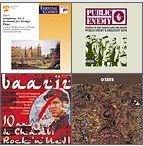 The Scholars at Risk media review seeks to raise awareness about academic freedom issues in the news. Subscription information and archived media reviews are available here. The views and opinions expressed in these articles are not necessarily those of Scholars at Risk.
The Scholars at Risk media review seeks to raise awareness about academic freedom issues in the news. Subscription information and archived media reviews are available here. The views and opinions expressed in these articles are not necessarily those of Scholars at Risk.
Scholars at Risk calls for letters on behalf of Professor Nasser bin Ghaith of the UAE
Scholars at Risk, 4/15
12 Organizations Ask U. of Virginia to Safeguard Climate Researcher’s Academic Freedom
The Chronicle of Higher Education, 4/14
Hastings’ board pulls UC brand from rights meeting
Bob Egelko, The San Francisco Chronicle, 4/13
Top PEN Prize to Honor Nasrin Sotoudeh, Jailed Iranian Lawyer, Writer, Activist
PEN, 4/13
Iran: independent civil society organisations ignored over draft law on associations
Education International, 4/12
Continue reading
Tag Archives: Egypt
Academic Freedom Media Review, March 26-April 1
 Compiled by Scholars at Risk
Compiled by Scholars at Risk
The Scholars at Risk media review seeks to raise awareness about academic freedom issues in the news. Subscription information and archived media reviews are available here. The views and opinions expressed in these articles are not necessarily those of Scholars at Risk.
Malawi police arrest 5 university students for rioting
Afrique en Ligne, 3/31
Unusual Ruling for Academic Freedom
Scott Jaschik, Inside Higher Ed, 3/31
Yale and National U. of Singapore Set Plans for New Liberal-Arts College
Karin Fischer, The Chronicle of Higher Education, 3/31
‘Academic Freedom’ Offers Little Protection Against New Efforts to Obtain Professors’ E-Mails
Peter Schmidt and Colin Woodard, The Chronicle of Higher Education, 3/29
Continue reading
Academic Freedom Media Review, March 5-11, 2011
 Compiled by Scholars at Risk
Compiled by Scholars at Risk
The Scholars at Risk media review seeks to raise awareness about academic freedom issues in the news. Subscription information and archived media reviews are available at here. The views and opinions expressed in these articles are not necessarily those of Scholars at Risk.
Presidential duress: fears for Belarusian academic freedom
Colin Graham, Times Higher Education, 3/10
CHINA: Unrest fears prompt alert at universities
Yojana Sharma, University World News, 3/10
Virginia Supreme Court Will Hear Appeal of Climate-Papers Case
The Chronicle of Higher Education, 3/10
Continue reading
Support the Libyan Opposition Now!

Earlier today Gaddafi vowed to crush protestors. A leader with no regard for the lives of his citizens.
While I was disappointed by that hesitancy, it was at least understandable. These leaders were allies of the West and, when the demonstrations started, at least when through the motions of promising a degree of reform. Mubarak went so far as to give the end date for his Presidency, after elections in September. Western governments, unsure about what was to come and aware that these leaders had been reliable allies, were hesitant to drop them.
Gaddafi has certainly not offered to step down, not now nor ever. He has also not offered any hint that he would be willing to accept any sort of reforms. Though in power since 1969, all he has done so far is justify his regime by evoking the “Green Revolution,” blamed everyone but himself for what is going on and threaten mass bloodshed.
Continue reading
Revolution in the Arab World: Why We Can't Just Stand Aside
It is amazing and inspiring to watch these demonstrations! It has been horrifying and shocking to watch the response of the Libyan regime!
It is considered naive to suggest that foreign policy should be based on principle. We are told it is necessary to be Machiavellian in safeguarding our national interest, and in the realm of foreign policy, realpolitik often trumps principle. I disagree. Perhaps I am, indeed, naive, but I believe that democracy, with protection for the rights of the minorities, is a principle that trumps almost all, and our policy ought to reflect that.
In the current wave of peaceful democratic revolutions sweeping the Arab world, US support of the citizen demonstrators has been slow and tepid. This in spite of the fact that sticking to our principles and unequivocally supporting the pro-democracy demonstrators is what is in our best economic and strategic interest. To do otherwise is a risky strategy, a strategy that, should it not go the way proponents believe, will have grave consequences.
Continue reading
Academic Freedom Media Review, February 5 – 11, 2011
 The Scholars at Risk media review seeks to raise awareness about academic freedom issues in the news. Subscription information and archived media reviews are available at here. The views and opinions expressed in these articles are not necessarily those of Scholars at Risk.
The Scholars at Risk media review seeks to raise awareness about academic freedom issues in the news. Subscription information and archived media reviews are available at here. The views and opinions expressed in these articles are not necessarily those of Scholars at Risk.
Universities must safeguard intellectual vitality
Andreas Hess, Irish Times, 2/10
Presidential duress: fears for Belarusian academic freedom
Colin Graham, Times Higher Education, 2/10
Travel Ban Extends to Family
Mihray Abdilim and Joshua Lipes, Radio Free Asia, 2/10
Faculty Group at U. of Puerto Rico Joins Students on Strike
The Chronicle of Higher Education, 2/10
The Beck-Piven Controversy
Peter Wood, The Chronicle of Higher Education, 2/10
Continue reading
Egypt Decides! Let's Stand Back for a While

Saturday, 12 February 2011, Day 1 Freedom - Victory Tahrir Square, Photo by Darla Hueske, Creative Commons license, Some rights reserved
Fortunately, this wave has not caused the death and destruction tidal waves usually do, because it is the people themselves who are the wave, and it is the elite who are being swept away, not in a bloody coup, but through real people power. Final costs have yet to be assessed. People were jailed and others killed, but violence and destruction to property have been minimal. The police were brutal and ruthless and far too many were killed, but protests continued and the police disappeared quickly. After that, the one significant effort of Mubarak loyalist to crack heads, backfired terribly.
Most Americans are excited by this wave of democracy and have an innate tendency to support it. Others got very nervous when the wave hit Egypt. What happens if the Muslim brotherhood takes over? There are even voices who get far to much airplay in the media and too much ink in the press who say that people in the region are incapable of self governance and need strong arm leadership. The most looney voice has to be Glenn Beck who fears Mubarak’s fall will open the door to a Islamist Caliphate that will spread until it meets and joins forces with a Chinese-led “red” wave on a quest for world domination.
Continue reading
TV News and Reporting from Egypt
Dear Media,
Please stop marveling at how anything is happening in Egypt even though the internet is shut down and people can’t get on Twitter or Facebook. You do realize that there were popular revolts before social media, don’t you? In the latter half of the 20th century we had the Prague Spring in 1968, the Soweto uprising in 1976, the Paris riots in 1968, and even Tiananmen Square in 89. How do you think people coordinated the labor demonstrations of the 30s, the anti-colonial revolts of the developing world in the decades following World War II. What about the French Revolution in 1789? OMG? How did they get anything done. They didn’t even have land lines!
Continue reading
Academic Freedom Media Review-November 13-19, 2010
Compiled by Scholars at Risk
The Scholars at Risk media review seeks to raise awareness about academic freedom issues in the news. Subscription information and archived media reviews are available here. The views and opinions expressed in these articles are not necessarily those of Scholars at Risk.
Second Azerbaijani ‘Donkey Blogger’ Freed
Claire Bigg, Radio Free Europe/Radio Liberty, 11/19
Azerbaijani Activist Detained On Georgian Border
Radio Free Europe/Radio Liberty, 11/19
Nobel Winner’s Absence May Delay Awarding of Prize
Andrew Jacobs and Alan Cowell, The New York Times, 11/18
Law students march to support UP professors
ABS-CBN News, 11/18
SINGAPORE: Yale partnership to go ahead, NUS says
Stanislaus Jude Chan, University World News, 11/18
Law clinics that go beyond theory face attacks
Sarah Cunnane, Times Higher Education, 11/18
Continue reading
Google Doodles: Umm Kulthum, Jan Amos Komensky and Others You Never Saw.
 Yesterday was the birthday of the great Egyptian singer Umm Kulthum, at least as far as records in her home province indicate. The 30th of December is also cited sometimes, but Google took notice yesterday and marked the occasion with a Google Doodle on the Egyptian version of their site. Given her significance in Egyptian culture, indeed Arab culture as a whole, the tribute is appropriate. Indeed, she probably ranks among the best known and most loved singers the world has ever know.
Yesterday was the birthday of the great Egyptian singer Umm Kulthum, at least as far as records in her home province indicate. The 30th of December is also cited sometimes, but Google took notice yesterday and marked the occasion with a Google Doodle on the Egyptian version of their site. Given her significance in Egyptian culture, indeed Arab culture as a whole, the tribute is appropriate. Indeed, she probably ranks among the best known and most loved singers the world has ever know.
I dare say, however, that few in America that are not of Arab descent have ever heard of Umm Kulthum. I certainly hadn’t until I was introduced to her by Middle Eastern television. To me that begs a question. Google Doodles are a learning opportunity, as the are accompanied by links to whatever the image represents. Of course Google wins points my honoring this great diva in Egypt and it also does its part in keeping her memory alive for a younger generation that, like young people all over the world, is becoming used to shorter pop songs, accompanied by slick video images.
Continue reading


